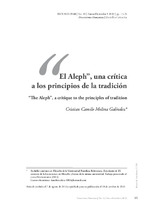"El Aleph”, una crítica a los principios de la tradición

View/
Date
2013xmlui.dri2xhtml.METS-1.0.item-type
article
Citación
Metadata
Show full item recordDocuments PDF
Abstract
En el relato “El Aleph” de Jorge Luis Borges, se propone una lectura del signo que identifica la primera letra del alfabeto hebreo (Aleph) desde la metafísica, pues desde la concepción cabalística este signo se plantea como una realidad que lo contiene todo y desde la concepción clásica como los atributos del ser: principio y fundamento. En este artículo se analizará el relato de Borges como una crítica a esta idea de ser, que es visto como realidad fundante, única e inmóvil. Se rastreará esa mirada irónica que el escritor argentino plantea como la no necesidad de conocer una realidad de tal magnitud. The story “The Aleph” by Jorge Luis Borges proposes to interpret from a metaphysical point of view, the sign which identifies the first letter of the Hebrew alphabet (aleph) since from the Kabbalistic conception this sign is considered a reality that contains all and from the classical conception it is considered as the attributes of being: both principle and foundation. This article will analyze the story as a critique of the idea of being, which is seen as a foundational reality: unique and stationary and trace the ironic view which the Argentinian writer equates to the lack of need to understand a reality of such a magnitude.
Keyword/s
Aleph
Borges
Cábala judía
Metafísica
Aleph
Borges
Jewish Kabbalah
Metaphysics
Collections
- No. 10 (2013) [15]
The following license files are associated with this item:

